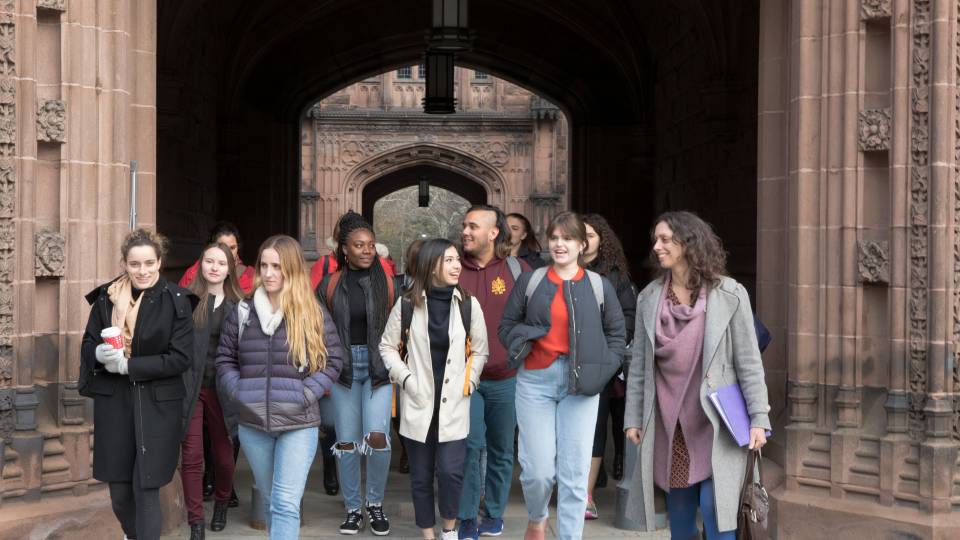New postdoctoral fellows at Princeton are pursuing research and teaching in the areas of comparative cultures, race, ethnicity, gender and sexuality, and global health. The postdoctoral research associates are: Catherine Clune-Taylor; Tala Khanmalek; Amy Krauss; Alecia McGregor; Laurel Mei-Singh; and Nomi Stone.
The scholars are supported by the Provost's Fund for Cultural Studies, which funds new courses and other academic initiatives in the areas of identity and culture. The fund was established in May 2015, following recommendations of the University's Special Task Force on Diversity, Equity and Inclusion. The fund provides additional support to departments to offer new and expanded courses in topics that are of growing interest to students. Proposals for this academic year are due Feb. 1 and may be submitted through the 250th Anniversary Fund for Innovation in Undergraduate Education.
"Thanks to the contributions of our postdoctoral fellows, our undergraduates are able to explore identity and culture in courses not previously available at Princeton," Provost David S. Lee said. "These courses create opportunities for our students to engage in these topics and with each other in new and enriching ways. By supporting these initiatives, we not only continue to expand knowledge in areas that are critically relevant to society today, but we also continue to create an environment at Princeton that encourages the exchange of differing perspectives and weaves diversity into all aspects of life at the University."
Senior Kat Kulke, an English major, said she jumped at the opportunity to take a new class on disabilities studies. She said the course has given her insights into a topic she always wanted to explore.
"I have been interested in the intersection of feminism and disability studies for a while, though I never had a chance to really explore it in real depth," Kulke said. "The class was exceptional, making complex theoretical material accessible and engaging."
More information about the postdoctoral fellows and the courses they teach is below.

Catherine Clune-Taylor (Photo courtesy of Catherine Clune-Taylor)
Catherine Clune-Taylor
Clune-Taylor is teaching this semester the course "Disability and the Politics of Life," cross-listed in the Program in American Studies and the Program in Gender and Sexuality Studies. The introduction to disability studies draws together the work of disability scholars, feminists and queer theorists with that of historians and clinicians in order to contextualize the field's major theoretical claims.
"Beyond an understanding of the main theoretical models in the field of disability studies, I hope that students walk away with a sense of the historical evolution and socio-politics of modern clinical medicine, as well as the central, organizing role that issues of race, gender, sexuality and class played in that evolution," she said. "Student response to the course has been quite positive thus far; there seems to be a real appetite for courses engaging these kinds of issues, and in-class discussion has been quite rich and generative."
In the spring, Clune-Taylor will teach the gender and sexuality studies course "Feminist Approaches to Bioethics," which will examine the history of bioethics and debates among feminist bioethics regarding key issues in the field.
Clune-Taylor earned her Ph.D. in philosophy from the University of Alberta. She holds a master's in philosophy, as well as a bachelor of medical science in immunology and microbiology and a bachelor of arts in philosophy from the University of Western Ontario.

Tala Khanmalek (Photo by Sameer A. Khan/Fotobuddy)
Tala Khanmalek
Khanmalek teaches courses in American studies and gender and sexuality studies. This semester she is leading the class "Race and Living Laboratories," which traces intersecting discourses of race, nation and disease throughout U.S. history. Students will learn about "living laboratories," or sites of state-sanctioned medical experimentation on populations deemed to harbor disease, as a way to consider the ways in which science has shaped the meaning of race and other categories of social difference.
In the spring, she will teach the seminar "Corpo-realities of Politics," which will explore the ways in which feminists of color talk about how multiple forms of oppression have affected their well-being.
"Both courses call attention to how various forms of storytelling effectively expose the intimate impacts of health disparities and their institutionalized roots in historical patterns of discrimination," she said. "In my current course, students are constantly making connections between the past and the present and using what we learn to imagine a more equitable future for all."
Khanmalek received her Ph.D. from the Ethnic Studies Department at the University of California-Berkeley, with an emphasis in women, gender and sexuality studies. She earned a master's degree in ethnic studies and a bachelor's degree in ethnic studies and French from UC-Berkeley.

Amy Krauss (Photo courtesy of Amy Krauss)
Amy Krauss
Krauss is affiliated with the Global Health Program at the Center for Health and Wellbeing in the Woodrow Wilson School of Public and International Affairs. This semester, she is leading a precept for the course "Critical Perspectives in Global Health," which provides a critical analysis of the social, political and economic processes related to the expanding field of global health.
"Students have done an outstanding job raising key questions about changing paradigms of global health intervention and policy," she said. "The course has brought together students with diverse disciplinary backgrounds such as molecular biology, economics, chemistry and anthropology."
In the spring, Krauss will teach the class "Gender and Illness Experience," cross-listed with anthropology, global health, and gender and sexuality studies. The course explores how gender is integral to constructions of health and illness in the United States, combining readings in anthropology, literature, women's and gender studies, and public health.
"My classes give students the chance to think critically about intersections of structural inequality and the creative ways people build a life with one another," Krauss said. "Through close reading, and in dialogue with one another, I hope students become both more curious about different perspectives and aware of the political and ethical implications of their own positions."
Krauss earned a Ph.D. in anthropology from Johns Hopkins University and a bachelor's degree in social thought and political economy the University of Massachusetts-Amherst.

Alecia McGregor (Photo courtesy of Alecia McGregor)
Alecia McGregor
McGregor was a postdoctoral fellow in the Global Health Program at the Center for Health and Wellbeing at the Wilson School. In spring 2016, she taught the course "Mortality at the Margins: Race, Inequality and Health Policy in the United States," cross-listed with global health and African American studies. The class examined the unequal distribution of disease and mortality in the United States along the lines of race, ethnicity, class and location. Students' work culminated in a policy memo and a presentation.
"I think students walked away with an appreciation of being able to deeply explore the multiple historical, socioeconomic and political drivers of health inequalities in the U.S. They enjoyed the process of writing targeted policy memos and completed policy presentations on a pressing health policy topic of their choice," she said.
McGregor is now an assistant professor in the Department of Community Health at Tufts University. She has Ph.D. in health policy with a certificate in Latin American studies and a bachelor's degree in social studies, both from Harvard University.

Laurel Mei-Singh (Photo courtesy of Laurel Mei-Singh)
Laurel Mei-Singh
Mei-Singh is a postdoctoral fellow in American studies and the Humanities Council teaching the course "Environmental and Social Crisis" this semester. The class examines the social and political elements of environmental crisis, working to define and understand the term and also to explore grassroots efforts for environmental, racial and economic justice.
In the spring, she will teach "Introduction to Asian American Studies: Race, War and Decolonization." The class approaches its subject from the premise that multiple racial projects contribute to Asian racial formation and that warfare plays a central role in these enterprises. The course will use comparative, transnational frameworks to study Asian Americanism and explore the intersections of race and indigeneity.
"I approach each class as a community of scholars dedicated to collaboration, creativity and rigorous engagement with ideas," Mei-Singh said. "Students arrive to my classes with diverse life experiences, backgrounds and learning styles. I encourage students to reflect on their own experiences while analyzing and connecting them to broad historical and structural processes. This enables them to develop their own ideas so that they see themselves as intellectuals and leaders capable of enacting social change."
Mei-Singh has a Ph.D. in geography with a certificate in American studies from the Graduate Center of the City University of New York. She earned a master's in public health from Columbia University and a bachelor's in English from University of California-Los Angeles.

Nomi Stone (Photo courtesy of Nomi Stone)
Nomi Stone
Stone is a postdoctoral fellow in the Department of Anthropology teaching "Foundational Concepts in Anthropology" this semester. The class provides an introduction to core anthropological models of inquiry into being human, studying key concepts of culture and exploring universalism and variation across societies.
She will teach "The Anthropology of Awe and Terror," cross-listed with the Program in Creative Writing this spring. The course explores encounters with awe and terror via the "sublime" experience — from trembling at a mountain to being struck mute by the threat of nuclear warfare. Drawing on philosophy, literature, ethnographies and art, the class examines such encounters in a variety of cultural, political, emotive and artistic contexts.
"I work to make my classroom vibrant, electric, kinetic and infused with wonder," Stone said. "I am also a poet. By bring together poetics and critiques of power, I want anthropology to startle us awake as enlivened and ethical thinkers and human beings."
Stone earned a Ph.D. in cultural anthropology at Columbia University. She has a master's degree in modern Middle East studies from Oxford University and a bachelor's degree in French literature from Dartmouth College. She was a Fulbright Scholar in creative writing in Tunisia and is completing a master's of fine arts in poetry from Warren Wilson College.




